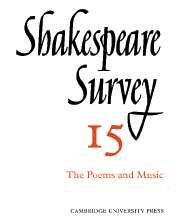Book contents
- Frontmatter
- Twentieth-century Studies in Shakespeare's Songs, Sonnets, and Poems
- Songs, Time, and the Rejection of Falstaff
- Shakespeare’s Sonnets and the Elizabethan Sonneteers
- Love’s Confined Doom
- Beasts and Gods: Greene’s Groats-worth of Witte and the Social Purpose of Venus and Adonis
- From Shakespeare’s Venus to Cleopatra’s Cupids
- Venus and the Second Chance
- Some Observations on The Rape of Lucrece
- An Anatomy of The Phoenix and The Turtle
- Shakespeare and the Ritualists
- Illustrations of Social Life IV: The Plague
- The Soest Portrait of Shakespeare
- International Notes
- Shakespeare Productions in the United Kingdom: 1960
- S. Franco zeffirelli’s Romeo and Juliet
- The Year's Contributions to Shakespearian Study 1 Critical Studies
- 2 Shakespeare’s Life, Times and Stage
- 3 Textual Studies
- Book Received
- Index
- Plate Section
Venus and the Second Chance
Published online by Cambridge University Press: 28 March 2007
- Frontmatter
- Twentieth-century Studies in Shakespeare's Songs, Sonnets, and Poems
- Songs, Time, and the Rejection of Falstaff
- Shakespeare’s Sonnets and the Elizabethan Sonneteers
- Love’s Confined Doom
- Beasts and Gods: Greene’s Groats-worth of Witte and the Social Purpose of Venus and Adonis
- From Shakespeare’s Venus to Cleopatra’s Cupids
- Venus and the Second Chance
- Some Observations on The Rape of Lucrece
- An Anatomy of The Phoenix and The Turtle
- Shakespeare and the Ritualists
- Illustrations of Social Life IV: The Plague
- The Soest Portrait of Shakespeare
- International Notes
- Shakespeare Productions in the United Kingdom: 1960
- S. Franco zeffirelli’s Romeo and Juliet
- The Year's Contributions to Shakespearian Study 1 Critical Studies
- 2 Shakespeare’s Life, Times and Stage
- 3 Textual Studies
- Book Received
- Index
- Plate Section
Summary
From Bion to Ronsard, from Ovid and Lucretius to Chaucer and Spenser, the poets of humanism have been charmed by Venus—and in more than the polite sense alone. She has revealed herself in many forms: as a shepherdess in Arcadia; a lovely lady in an allegorical garden; alma Venus, the all-creating mother; Aphrodite Urania, the queen of heaven. By some she has been portrayed as a cruel, a fickle, or a feckless tyrant; others have caught her smiling. Only Shakespeare, it would seem, viewed her as thoroughly absurd, a fat white woman whom nobody loved. Forty years old, fluttery and apprehensive, loquacious and perspiring: such is the impression which the heroine of his first poem has made upon several distinguished scholar-critics. Nor is Venus only ridiculous. She is also the personification of lust, that sullies all it touches; mistress of the dark horse from Plato’s Phaedrus; a figure of evil eminence comparable with Milton’s Satan. It is strange to think of Shakespeare, with the romantic comedies and the sonnets in praise of increase still to write, taking so hard a view, or views, of the love goddess. An alternative to be reckoned with is that these attitudes are rather the projections of a twentieth-century puritanism and its dissatisfaction with some Renaissance ways of interpreting love. After all, it is understandable that an age much concerned with obliterating the humanist image of man should feel profoundly out of sympathy with Shakespeare’s approach. His poem is erotic, but not prurient; it is also philosophical, without an improving ideology. For modern readers the story should be carried to a more entertaining conclusion; or, from the other standpoint, should teach a lesson that sexuality does not pay.
- Type
- Chapter
- Information
- Shakespeare Survey , pp. 81 - 88Publisher: Cambridge University PressPrint publication year: 1962
- 1
- Cited by



